|
|
|
Sort Order |
|
|
|
Items / Page
|
|
|
|
|
|
|
| Srl | Item |
| 1 |
ID:
186578
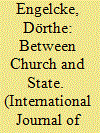

|
|
|
|
|
| Summary/Abstract |
In most Middle Eastern jurisdictions, the applicable family law is determined based on the religious affiliation of the parties involved. Whereas Jordanian Islamic family law has last been reformed in 2001, 2010, and 2019, and the law that regulates the shariʿa courts has been amended several times since 1972, the family laws of Christian communities and the church courts have largely been exempted from this reform dynamic. Based on semi-structured interviews as well as the review of written sources, this article investigates why it is difficult to reform the church courts and even more difficult to reform the family laws of Christian communities, using the Greek Orthodox community in Jordan as a case study. I argue that conflicts within the Greek Orthodox Patriarchate of Jerusalem and the fact that the jurisdiction of the patriarchate over family law transcends Jordanian state boundaries have made state-led reform challenging and presented obstacles for Jordanian Christians lobbying for change.
|
|
|
|
|
|
|
|
|
|
|
|
|
|
|
|
| 2 |
ID:
186589


|
|
|
|
|
| Summary/Abstract |
At the intersection of multipolar, multi-scalar sites of mutual exchange and tension, Afghanistan and Iraq conjure imaginaries of shadowy and risky geographies wired up to dispersed terrorist cells around the globe. These spaces constitute the sites where the “civilizing process” of the “War on Terror” takes place, “laboratories of globalization” where global hegemonic neoliberal projects of free market democratization and development get stranded. At the same time, they are spaces where global interconnections are accelerated, and where multiple mobilities, often contingent upon expectations about the successes and failures of reconstruction, are interwoven, producing networks that extend well beyond national borders.
|
|
|
|
|
|
|
|
|
|
|
|
|
|
|
|
| 3 |
ID:
186587


|
|
|
|
|
| Summary/Abstract |
At the dawn of the 21st century the “War on Terror” ushered in an era in which some were besieged by wars and others by war-related imagery. For the fortunate who live outside of war zones, mostly in the Global North and West, the experience of war has been primarily a mediated one. With the advent of digital imagery and its many evolving and developing technological transmutations, the possibilities of reproduction, representation, manipulation, and circulation have grown exponentially in the past twenty years. Yet in the grand scheme of human communication history, the “pictorial turn” is a relatively recent phenomenon that requires further analysis. In this article, I unpack and analyze some of the key media moments from the vast visual lexicon and iconography of the “War on Terror” to reveal its scaffolding and machinations and offer counterstrategies of resistance. I argue that the “War on Terror” is the orchestrated sum of literal and figurative imagery, a coordinated public relations disinformation media campaign designed to hide real wars and their true destruction and costs.
|
|
|
|
|
|
|
|
|
|
|
|
|
|
|
|
| 4 |
ID:
186585


|
|
|
|
|
| Summary/Abstract |
Standing inside a t-wall factory in Erbil in the summer of 2021, I was struck by the fact that, nearly twenty years after the US invasion of Iraq, these military walls were still in production. T-walls are six-ton steel-reinforced, blast-proof concrete wall segments named for their upside-down t-shape (Fig. 1). They were introduced to Afghanistan and Iraq in the early 2000s. Derivative of the Berlin wall's design, they are recognizable to those who have witnessed the Israeli separation wall, which is composed of thousands of t-walls lined up.
|
|
|
|
|
|
|
|
|
|
|
|
|
|
|
|
| 5 |
ID:
186580
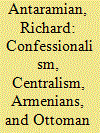

|
|
|
|
|
| Summary/Abstract |
This article argues that non-Muslim engagement with 19th-century Ottoman reform should be understood in the context of a confessionalized politics that originally fostered partnerships of governance in the 18th century. The confessionalization of non-Muslim communities in the 18th century, which resulted in the political empowerment of Istanbul-based ethnarchs, promoted the establishment of robust communal boundaries that were more legible to the central state. These arrangements also made non-Muslim communities such as the Armenians partners in governance, responsible for supporting the state's effort to maintain its place atop a contentious imperial politics. The Tanzimat reforms, which reorganized non-Muslim communities and devolved some power from the clergy to the laity, were not a novelty, but instead a renegotiation of non-Muslims’ roles in the centralization of state. Rather than embrace secularized identities, non-Muslims enthusiastically used their own religious institutions to promote state centralization. In the process, they reconfigured relations of power in the region that left non-Muslims structurally marginalized.
|
|
|
|
|
|
|
|
|
|
|
|
|
|
|
|
| 6 |
ID:
186581


|
|
|
|
|
| Summary/Abstract |
As the US-led global “War on Terror” enters its third decade, the structural, physical, and epistemological violence it has wrought continues to shape lives and landscapes in Afghanistan and Iraq. At present, the scholarship of an entire generation of Middle Eastern Studies has been embedded in the geopolitical realities of this indefinite war, even those whose work does not directly confront it. Yet despite the war's enduring presence, scholars working on Afghanistan and Iraq rarely find the opportunity to reflect with one another on how the global assemblage of international military intervention and the creation of a shifting target of terrorism has narrowed our foci. Instead, these geographies are yoked together in often destructive and superficial ways, erasing older forms of interregional connectivity and longer genealogies of violence.
|
|
|
|
|
|
|
|
|
|
|
|
|
|
|
|
| 7 |
ID:
186582


|
|
|
|
|
| Summary/Abstract |
Afghanistan assumed its modern cartographic form in piecemeal fashion between the late 1860s and early 1890s in the context of British imperial boundary-making projects in South Asia and the Middle East. The bordering of Afghanistan was contextualized by the global British empire and multiple boundary conflicts and frontier anxieties involving the British and the French, German, Russian, and other imperial powers as well as local rulers. The fundamental point here is that the map of Afghanistan is a product of imperial and interimperial concerns, and it has not benefited the Afghan people. The map of Afghanistan may or may not have served the imperial purposes for which it was created, but more importantly, by uncritically accepting it and its imperial heritage, we Afghans have become victims of an imperial map of ourselves. Afghans and non-Afghans will benefit from directly confronting the coercive impact of imperial mapping agendas on the largely invisible people “on the map” of Afghanistan. This essay historicizes the production of maps of modern Afghanistan, exposing imperial and crypto-colonial influences upon our national cartography. In so doing, it critically reimagines our spatial politics and reconfigures our intellectual infrastructure. It is an exercise in historical recentering designed to instill Afghan humanity and agency onto the map of Afghanistan.
|
|
|
|
|
|
|
|
|
|
|
|
|
|
|
|
| 8 |
ID:
186579
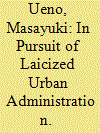

|
|
|
|
|
| Summary/Abstract |
The Ottoman Empire introduced the muhtar system in Istanbul in 1829, appointing lay headmen, called muhtar, to the lowest levels of urban administration: Muslim neighborhoods; Orthodox, Armenian, and Catholic parishes; and Jewish congregations. This reform resulted in the overlapping of state responsibilities and those of non-Muslim religious authorities, later leading to disputes between the groups. This article investigates such disagreements in an effort to understand how state officials perceived non-Muslim religious authorities’ participation in imperial governance. In so doing, this article argues that, as non-Muslim political movements began developing during the late nineteenth century, state officials adopted a cautious attitude toward non-Muslim clergy, viewing the latter as requiring more careful handling than the layman. This take on clergymen was a shift, a reconsideration of the exceptional treatment they had previously enjoyed, and ignited a growing desire to sever the ties, formerly tolerated, between muhtars and religious authorities.
|
|
|
|
|
|
|
|
|
|
|
|
|
|
|
|
| 9 |
ID:
186590


|
|
|
|
|
| Summary/Abstract |
In November 1911 half a dozen international students gathered at the Edinburgh University Student Union to write a letter to the Muslims of the world. The resulting Edinburgh Declaration called on “our Muslim brothers” to organize charitable collections in aid of the Ottoman Navy League as part of their celebration of Eid al-Adha. The declaration presented Italy's September 1911 invasion of Ottoman territory in North Africa as an assault “not only against the Ottomans or against a single Islamic government” but as an attack on Islam itself.Footnote1
|
|
|
|
|
|
|
|
|
|
|
|
|
|
|
|
| 10 |
ID:
186575
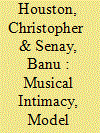

|
|
|
|
|
| Summary/Abstract |
Niyazi Sayın is an Istanbul-born ney (reed flute) virtuoso, and the most acclaimed musician of a musical tradition controversially called “Ottoman-Turkish classical music.” Now 94 years old, Sayın has been called insan-i kamil (a perfect human), kutb-ı nayi, (the musical spiritual axis of his age), and hezarfen (master of a thousand arts). What do such titles mean? Building upon the work of Martin Stokes on popular music and its fashioning of intimate publics, this paper explores Sayın's musical life. We argue that it provides an exemplary expression of cultural intimacy for listeners and students, one that (as reflected in his titles) demonstrates a particular way of becoming a person, a Muslim, and a model citizen. In contrast with more official constructions of citizenship, as well as with the political neo-Ottomanism of the Justice and Development Party (AKP), Sayın's life and music open up alternative possibilities of self-alteration for those who engage with it.
|
|
|
|
|
|
|
|
|
|
|
|
|
|
|
|
| 11 |
ID:
186577
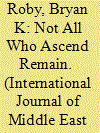

|
|
|
|
|
| Summary/Abstract |
In the wake of Israeli Black Panther activism in the mid-1970s, the Arab League invited Mizrahi (Afro-Asian) Jews, especially those in Israel, to return to their homeland. Some Israelis used the invitation as an opportunity to highlight the extent of anti-Mizrahi discrimination by departing for the Arab world. Albeit small in number in comparison to those who left Israel for other destinations, those who repatriated made a huge impact on perceptions of Israeli emigres. Their importance rested not in their numbers but in the significant threat posed to the Israeli establishment. Afro-Asian Jewish repatriation sent a message that the Zionist project, particularly as the opposing nationalist movement to Pan-Arabism, was a failure.
|
|
|
|
|
|
|
|
|
|
|
|
|
|
|
|
| 12 |
ID:
186588


|
|
|
|
|
| Summary/Abstract |
I came of age in the early years of the “War on Terror.” As a young student activist, my initial arguments against the wars in 2001 and 2003 followed a common logic, responding to disinformation, ahistorical narratives, and false claims about Iraq, Afghanistan, and Muslims. Like many who work in the fields of Middle Eastern studies, this work was driven by the belief that exposing the narratives of the target nations to be wrong would in turn expose the false premises behind the wars. I have by now spent my entire adult life researching, writing, and teaching about the “War on Terror” with a specific focus on the war on Iraq. My hope was that “humanizing” and providing more insight into the views of the people “over there” would alter popular ideas in the United States and steer American state actions in a different direction than intervention.
|
|
|
|
|
|
|
|
|
|
|
|
|
|
|
|
| 13 |
ID:
186586


|
|
|
|
|
| Summary/Abstract |
In the fall of 2021, I taught a graduate seminar entitled Women and Gender in the Arab World at Georgetown University. It had been two decades since 9/11 and the start of the “War on Terror,” events that most of my students were not old enough to recall, but which still had, in one way or another, profoundly shaped their interest or experience in the region. In planning the course, I received a syllabus that had been used in past years. The first week was an introduction to the course, and it consisted of two essays intended to frame the state of the field of Middle East women's studies: Lila Abu-Lughod's “Do Muslim Women Really Need Saving?” and Mounira Charrad's “Gender in the Middle East: Islam, State, and Agency.”
|
|
|
|
|
|
|
|
|
|
|
|
|
|
|
|
| 14 |
ID:
186576
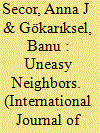

|
|
|
|
|
| Summary/Abstract |
This study takes a critical perspective on the making of sectarian difference and Alevi precarity in contemporary Turkey. Drawing on our research from 2013 to 2016, we present an analysis of stories and conversations that took place amongst Alevi and Sunni focus group participants, primarily in Istanbul. These conversations illustrate how sectarian difference can be made in the relations between neighbors as differences become coded as sectarian and taken up within systems of power and domination. At the same time, our research also shows how, in the entangled relations between neighbors, questions of ethics and mutual responsibility arise, though these relations sometimes become uneasy or even unbearable. Finally, we show how the question of “knowing” difference is taken up within a power-laden discourse of sectarianism, one that is tied to the history of Alevis (and others) in Turkey while also extending well beyond this context.
|
|
|
|
|
|
|
|
|
|
|
|
|
|
|
|
| 15 |
ID:
186583


|
|
|
|
|
| Summary/Abstract |
When I first began my doctoral work on Afghanistan, and up until quite recently, I had never wanted to write about war. I began my PhD only a month before 11 September 2001, but already the field had been so overdetermined by war—by ideas of political Islam, by the political economy of violence—that I resolved to write a thesis about vital unanswered questions regarding Afghanistan's longer history. Of course I grew to regard this strategy of ignoring war as both naive and morally indefensible. For quite a while, this shaped my teaching more than my research. In my classes on Afghanistan's wars and on political Islam, for instance, we address the global structures of violence head on from a variety of directions, beginning with those that Yousef Baker outlines in his contribution to this roundtable, focusing on the generative forces in US politics amid a neoliberal global context and extending to the devastating ontological destruction that Kali Rubaii discusses in her contribution. In all of this, however, students in particular—especially at an institution like SOAS that is so directly tied to the Global South—repeatedly ask: “Where are we in this? We know that this is how global violence works, but this is surely in some way about us too. And our societies are more than what Tarak Barkawi and Shane Brighton call ‘War/Truth.’” Interlocutors in Pakistan and Afghanistan during my fieldwork there made these points even more strongly.
|
|
|
|
|
|
|
|
|
|
|
|
|
|
|
|
| 16 |
ID:
186584


|
|
|
|
|
| Summary/Abstract |
In November 2010, twenty-four heads of member states of NATO assembled for a summit in Lisbon. On their agenda was an overhaul of the alliance's decade-long security strategy. On the sidelines of this summit, the heads of government met with Afghan President Hamid Karzai and announced plans to withdraw all NATO troops from Afghanistan by the end of 2014. The decision was not wholly unexpected. However, in newsrooms and among select consulting firms that worked with Afghan ministries in the capital Kabul, the announcement ratcheted up a sense of unease. Doubts were cast over the Afghan national army's preparedness to carry out solo combat operations.
|
|
|
|
|
|
|
|
|
|
|
|
|
|
|
|
|
|
|
|
|